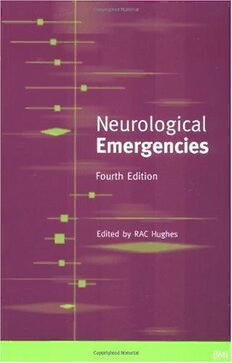
Neurological Emergencies 4th Edition PDF
492 Pages·2003·2.071 MB·English
Most books are stored in the elastic cloud where traffic is expensive. For this reason, we have a limit on daily download.
Preview Neurological Emergencies 4th Edition
Description:
The 4th edition of “Neurological emergencies” edited by Professor Richard Hughes presents an up to date guide to the pathogenesis and management of common emergencies in neurology (acute stroke, tonic-clonic status epilepticus), neurosurgery (traumatic brain injury, raised intracranial pressure, subarachnoid haemorrhage, acute spinal cord compression) and related specialties such as medicine (medical coma), intensive care (acute neuromuscular respiratory paralysis, brain stem death), infectious diseases (cerebral infection), ophthalmology (acute visual loss) and psychiatry (delirium, acute behaviour disturbance). The volume complements a small series of related titles from the same publishers on epidemiology, investigation and management of neurological disorders. Each of the 13 chapters authored by experts in the respective fields is clearly and consistently structured, providing a detailed outline of pathogenesis as a rational basis for recommended investigations and management of specific conditions. Pathophysiological considerations are comprehensive and incorporate recent advances such as the increased understanding of the neurochemical basis of secondary brain injury and the association between specific apolipoprotein E genotypes and an increased risk of Alzheimer’s disease following head trauma. Recommended diagnostic strategies are clearly outlined and advantages and limitations of specific investigations are discussed in the context of each clinical scenario. Numerous tables throughout the text (for example on investigation of stroke, delirium and neuromuscular disorders associated with respiratory paralysis) allow for easily accessible and concise reference.
See more
The list of books you might like
Most books are stored in the elastic cloud where traffic is expensive. For this reason, we have a limit on daily download.
